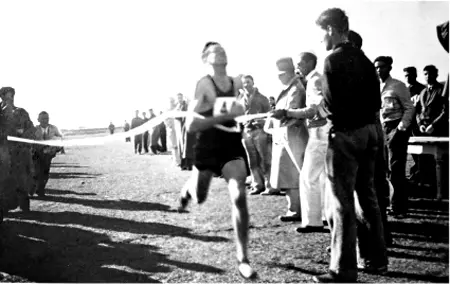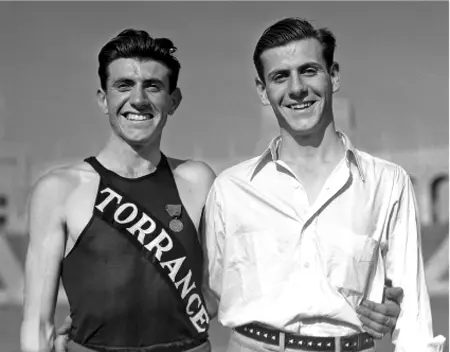When the school track season began in February, Louie set out to see what training had done for him. His transformation was stunning. Competing in black silk shorts that his mother had sewn from the fabric of a skirt, he won an 880-yard race, breaking the school record, co-held by Pete, by more than two seconds. A week later, he ran a field of milers off their feet, stopping the watches in 5:03, three seconds faster than Pete’s record. At another meet, he clocked a mile in 4:58. Three weeks later, he set a state record of 4:50.6. By early April, he was down to 4:46; by late April, 4:42. “Boy! oh boy! oh boy!” read a local paper. “Can that guy fly? Yes, this means that Zamperini guy!”
Almost every week, Louie ran the mile, streaking through the season unbeaten and untested. When he ran out of high school kids to whip, he took on Pete and thirteen other college runners in a two-mile race at Compton. Though he was only sixteen and had never even trained at the distance, he won by fifty yards. Next he tried the two-mile in UCLA’s Southern California Cross Country meet. Running so effortlessly that he couldn’t feel his feet touching the ground, he took the lead and kept pulling away. At the halfway point, he was an eighth of a mile ahead, and observers began speculating on when the boy in the black shorts was going to collapse. Louie didn’t collapse. After he flew past the finish, rewriting the course record, he looked back up the long straightaway. Not one of the other runners was even in view. Louie had won by more than a quarter of a mile.
He felt as if he would faint, but it wasn’t from the exertion. It was from the realization of what he was.

Louie wins the 1933 UCLA Cross Country two-mile race by more than a quarter of a mile. Pete is running up from behind to greet him. Courtesy of Louis Zamperini
Three The Torrance Tornado
IT HAPPENED EVERY SATURDAY. LOUIE WOULD GO TO THE track, limber up, lie on his stomach on the infield grass, visualizing his coming race, then walk to the line, await the pop of the gun, and spring away. Pete would dash back and forth in the infield, clicking his stopwatch, yelling encouragement and instructions. When Pete gave the signal, Louie would stretch out his long legs and his opponents would scatter and drop away, in the words of a reporter, “sadly disheartened and disillusioned.” Louie would glide over the line, Pete would be there to tackle him, and the kids in the bleachers would cheer and stomp. Then there would be autograph-seeking girls coming in waves, a ride home, kisses from Mother, and snapshots on the front lawn, trophy in hand. Louie won so many wristwatches, the traditional laurel of track, that he began handing them out all over town. Periodically, a new golden boy would be touted as the one who would take him down, only to be run off his feet. One victim, wrote a reporter, had been hailed as “the boy who doesn’t know how fast he can run. He found out Saturday.”
Louie’s supreme high school moment came in the 1934 Southern California Track and Field Championship. Running in what was celebrated as the best field of high school milers in history, Louie routed them all and smoked the mile in 4:21.3, shattering the national high school record, set during World War I, by more than two seconds. *His main rival so exhausted himself chasing Louie that he had to be carried from the track. As Louie trotted into Pete’s arms, he felt a tug of regret. He felt too fresh. Had he run his second lap faster, he said, he might have clocked 4:18. A reporter predicted that Louie’s record would stand for twenty years. It stood for nineteen.

Louie and Pete. Bettmann/Corbis
Once his hometown’s resident archvillain, Louie was now a superstar, and Torrance forgave him everything. When he trained, people lined the track fence, calling out, “Come on, Iron Man!” The sports pages of the Los Angeles Times and Examiner were striped with stories on the prodigy, whom the Times called the “Torrance Tempest” and practically everyone else called the “Torrance Tornado.” By one report, stories on Louie were such an important source of revenue to the Torrance Herald that the newspaper insured his legs for $50,000. Torrancers carpooled to his races and crammed the grandstands. Embarrassed by the fuss, Louie asked his parents not to watch him race. Louise came anyway, sneaking to the track to peer through the fence, but the races made her so nervous that she had to hide her eyes.
Not long ago, Louie’s aspirations had ended at whose kitchen he might burgle. Now he latched onto a wildly audacious goal: the 1936 Olympics, in Berlin. The Games had no mile race, so milers ran the 1,500 meters, about 120 yards short of a mile. It was a seasoned man’s game; most top milers of the era peaked in their mid-twenties or later. As of 1934, the Olympic 1,500-meter favorite was Glenn Cunningham, who’d set the world record in the mile, 4:06.8, just weeks after Louie set the national high school record. Cunningham had been racing since the fourth grade, and at the 1936 Games, he would be just short of twenty-seven. He wouldn’t run his fastest mile until he was twenty-eight. As of 1936, Louie would have only five years’ experience, and would be only nineteen.
But Louie was already the fastest high school miler in American history, and he was improving so rapidly that he had lopped forty-two seconds off his time in two years. His record mile, run when he was seventeen, was three and a half seconds faster than Cunningham’s fastest high school mile, run when he was twenty. *Even conservative track pundits were beginning to think that Louie might be the one to shatter precedent, and after Louie won every race in his senior season, their confidence was strengthened. Louie believed he could do it, and so did Pete. Louie wanted to run in Berlin more than he had ever wanted anything.
In December 1935, Louie graduated from high school; a few weeks later, he rang in 1936 with his thoughts full of Berlin. The Olympic trials track finals would be held in New York in July, and the Olympic committee would base its selection of competitors on a series of qualifying races. Louie had seven months to run himself onto the team. In the meantime, he also had to figure out what to do about the numerous college scholarships being offered to him. Pete had won a scholarship to the University of Southern California, where he had become one of the nation’s top ten college milers. He urged Louie to accept USC’s offer but delay entry until the fall, so he could train full-time. So Louie moved into Pete’s frat house and, with Pete coaching him, trained obsessively. All day, every day, he lived and breathed the 1,500 meters and Berlin.
In the spring, he began to realize that he wasn’t going to make it. Though he was getting faster by the day, he couldn’t force his body to improve quickly enough to catch his older rivals by summer. He was simply too young. He was heartbroken.
In May, Louie was leafing through a newspaper when he saw a story on the Compton Open, a prestigious track meet to be held at the Los Angeles Coliseum on May 22. The headliner in the 5,000 meters—three miles and 188 yards—was Norman Bright, a twenty-six-year-old schoolteacher. Bright had set the American two-mile record in 1935 and was America’s second-fastest 5,000-meter man, behind the legendary Don Lash, Indiana University’s twenty-three-year-old record-smashing machine. America would send three 5,000-meter men to Berlin, and Lash and Bright were considered locks. Pete urged Louie to enter the Compton Open and try his legs at a longer distance. “If you stay with Norman Bright,” he told Louie, “you make the Olympic team.”
Читать дальше














